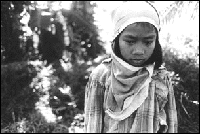|
|
|
監督:ディツィ・カロリノ、サダナ・ブクサニ
Director : Ditsi Carolino, Sadhana |
ディツィ・カロリノはフィリピン大学で社会学を専攻。始めは写真家として、草の根団体のため、スライド上映会映会を5年間行ってきた。1991年にフィルムワークショップに参加して以来、ドキュメンタリー映画を撮り始める。その作品の多くは貧困のなかでの生活とその葛藤を描いたものだ。これまで『Manggagawa, Kamanlilikha』(91)、『Trails to an Answer』(92)、『Dapit-hapon sa Tambakan』(93)、『Liberating Coops』(94)、『Keeping the Coop Fire Burning』(95)、『No Time for Play』(96)などを製作。彼女の作品、とりわけ子どもに焦点をあてたものはフィリピンで多くの賞を獲得している。 Ditsi Carolino got a degree in Sociology at the University of the Philippines. She began her career doing photography and slideshows for grassroots communities for five years. Since attending a film workshop in 1991, she has directed documentaries, many of them on the lives and struggles of the poor. Films include: Masakit sa Mata (co-dir, 91), Manggagawa, Kamanlilikha (91), Trails to an Answer (92), Dapit-hapon sa Tambakan (93), Pinakatagong Lihim ng Simbahan (94), Liberating Coops (94), Keeping the Coop Fire Burning (95), No Time for Play (96). Her documentaries, notably the ones on children, have won awards in the Philippines.
Sadhana Buxani is a visual artist and documentary photographer. She also worked as a community organizer in war-torn Mindanao and the slums of Manila before she began to make documentaries. Children Only Once is her debut film. |
 |
|
| フィリピン各地の児童労働の実態を胸にせまる映像に収めた作品。小さな子どもたちが屠殺場、サトウキビ畑や船着き場で行なう過酷な労働は、わずかな賃金となって家計の支えにされる。そんななかでも仕事の後は遊びと笑顔がもどる子どもたちの屈託なさがまぶしい。 | This is a documentary about child labor in the Philippine provinces. The directors recorded small children working under excruciating conditions in slaughterhouses, sugarcane fields, and ship docks in order to add to their family income. Images of the children's carefree joy after release from work capture the essence of childhood and emphasize their plight. |
|
|
|
|
監督のことば 映画一本が、想いもしていなかった方向に人を導いていくのは不思議なものです。このプロジェクトを始めた時に私たちが目指していたのは児童労働についての事実を明かすことだけでした。つまり、児童労働を発展途上国の光景の一部として見慣れてしまっている人の偏見の目隠しを外す、ということでした。私たちは他の人々を説得できるものを作ろうと働き始めましたが、最終的には私たち自身が誰よりも大きく改心したのです。 自分自身の人生と私たち全員を結びつけている責任の連関を深く見つめなければ、これらの子どもたちの生活をフィルムにおさめることはできません。最終的に私たちはドキュメンタリー映画作家であることにとどまらず、この児童労働に反対する活動の主張者となりました。つまりこの活動を行う非政府組織ネットワークの一員になったのです。 私たちがインタビューした子どもたちは歯切れよい発言をし、子どもらしくありながら、年令のわりには大人びていました。彼らはその苛酷な生活のために非凡な人格を育んでいましたが、これはドキュメンタリーという形式にうまく写しとられています。子どもたちが自分たちの生活や考え方をこのようにオープンに私たちと分かちあってくれたことに、私たちは非常に驚きました。もちろん、私たちがごく簡単な機材だけの小人数のクルーであったこともその理由でしょう。私たちは女性2人のチームで調査、撮影、音声、脚本、音響をすべてこなしました。大がかりな機材もなければ、照明もなく、大柄な男が子どもたちを怯えさせることもなく…。そのために子どもたちも打ちとけやすかったのでしょう。 子どもたちはありのままの姿でいるだけで、観客から大いに共感を得るのです。彼らの力強さ、禁欲的なありよう、柔軟さとユーモアは観客の心を動かさずにはいないのです。 |
Director's Statement It's funny how one film can take you in directions you never imagined. When we began this project, all we wanted was to do an eye-opener on child labor. One that would remove the blinders from viewers so used to seeing child labor as part of the landscape of a developing country. We started off trying to produce something to convince others. In the end, we came off the biggest converts. You can ' t film these children's lives without looking deep into your own and the line of responsibility that links us all. In the end, we found ourselves becoming more than just documentarists; we had turned advocates. We became part of a network of NGOs working against child labor. The kids we interviewed were articulate, child-like yet mature for their age. The hard life they led built extraordinary characters which translated so well in the documentary form. We marveled at how openly they shared their lives and thoughts with us. Of course it helped that we were a small crew with very simple equipment. We operated as a two-woman team doing research, camera, sound, script, and PA work altogether. No heavy equipment, no lights, no big guys to intimidate them... This helped the children to open up. And by simply being themselves, the children generate a tremendous amount of empathy from viewers who are invariably moved by their strength and stoicism, resilience and humor. |

